Fewer fist-fights, less sex: TV gets makeover for Covid production
As production resumes, fear of contagion is changing everything about making television; ‘Are we crazy to be doing this?’
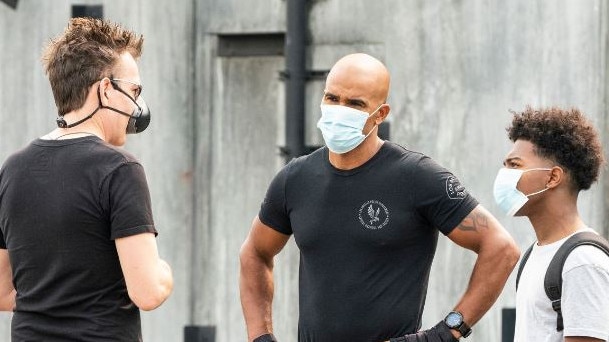
Just before production resumed in August on the hit CBS police drama S.W.A.T., co-creator and executive producer Shawn Ryan called an infectious-disease expert with one question.
“Are we crazy to be doing this?” Mr Ryan asked Marissa Baker, a professor at the University of Washington.
Ms Baker, who specialises in potential exposure to infectious diseases, reassured Mr Ryan that if the show followed the coronavirus protocols she advocated to protect the cast and crew, it should be fine.
Easier said than done. As Hollywood resumes production in the midst of a pandemic, fear of COVID-19 is changing how television gets made. Producers are avoiding scenes with crowds, guest stars or intimacy between characters, wherever possible. Crew members have backups in case they get sick. Special cameras give the illusion that actors are near each other when they are far apart.
For some, regardless of all the safety measures, the health risks are too great to participate.
On the set of S.W.A.T., which is produced by Sony Pictures Television, actors and the people who need to be close to them, such as directors and sound technicians, are usually in what is known as “Zone One” or the “A Zone.” The other zones are for people who don’t need to be near the actors, including producers and writers. Cast and crew typically wear wrist bands identifying which section they can be in.
All the actors on S.W.A.T. and the people who are in constant contact with them get tested at least three times a week, while others on the set get tested once a week. Bigger shows with larger budgets often have additional crew members on call who are undergoing the same testing as those working on the program — akin to being an alternate juror, a CBS executive said.
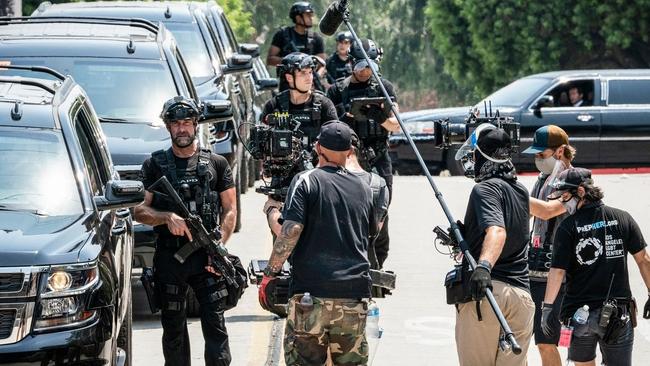
Such COVID-19 testing and safety measures are quickly becoming standard across Hollywood, and the price tag is steep: more than $300,000 an episode for a typical one-hour drama, and over $150,000 an episode for a comedy, according to people familiar with production finances. That amounts to a 10per cent to 15per cent increase in cost per episode, the people said. Network and streaming outlets are kicking in to help studios and producers shoulder the extra costs.
“Things like testing can be very expensive. PPE is very expensive. Reconfiguring sets can be very expensive,” said Sony Pictures Television President Jeff Frost.
When actors or crew members test positive, production can grind to a halt. This week, NBC soap opera Days of Our Lives and HBO historical drama The Gilded Age both suspended production after crew members tested positive.
Most of America’s corporations are figuring out how to return to the office. The entertainment industry faces some special challenges. For one thing, the workplace can change every day, in configuration and location. On a typical set there are scores of people with vastly different responsibilities and importance working close to one another — a megastar getting paid millions of dollars is alongside a boom mic holder or makeup artist. Treating everyone safely while taking special care of the performers, who can’t work with masks on, is no small effort.
Although most of Los Angeles still can’t eat indoors or go to a gym, and many of the nation’s movie theatres are still closed or operating at low occupancy, the entertainment industry felt it was crucial to get the TV cameras rolling again. Broadcast and cable networks and new streaming services such as Comcast Corp.’s Peacock, AT&T Inc.’s HBO Max and Walt Disney Co.’s Disney+ are starved for fresh content. Even Netflix Inc., which has banked enough content to get through next year, needs a constant flow of new material to maintain its streaming dominance.
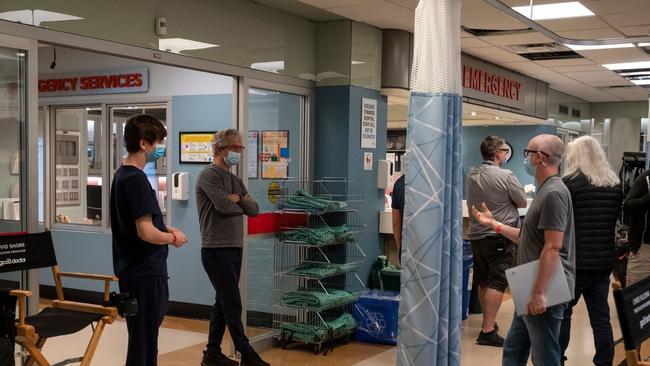
S.W.A.T., which is known for its well-choreographed fight scenes and occasional romances, now requires storylines with less action and sex. Actors typically stay the recommended 6 feet apart, and physical contact between them is limited. “I don’t get to do any hanky-panky,” said the show’s star, Shemar Moore, who added that he also misses hand-to-hand combat.
The most action Mr Moore gets now is having a swab stuck up his nose several times a week to test for the virus. “It’s annoying,” he said. “We’d all rather not be doing this, but this is what it takes to be safe.” Some shows have been victims of slow test results. In Vancouver, production on many TV shows, including ABC’s “A Million Little Things” and the CW’s “Riverdale,” was halted when labs processing COVID-19 tests got backed up and results were delayed.
The real fear for studios and networks is what happens when the day is done and the cast and crew go home. “It’s only going to be as good as the commitment you make to how you’re going to be when you’re away from the set,” said John Wells, a prolific producer who currently has three shows going at once, including Showtime’s Shameless and TNT’s Animal Kingdom.
“We have lots of conversations about keeping your bubble small at home,” he said. “If you don’t feel comfortable with that and you want to go on a boat with a bunch of other people on the weekend, this isn’t the job for you.”
Ms Baker, the consultant for S.W.A.T. and other Sony shows, said a movie or TV set is most similar to a construction site with lots of contractors and subcontractors. “You have a lot of different groups working together under one umbrella,” she explained. “It can be confusing as to who should be in charge and who you’re taking orders from.”
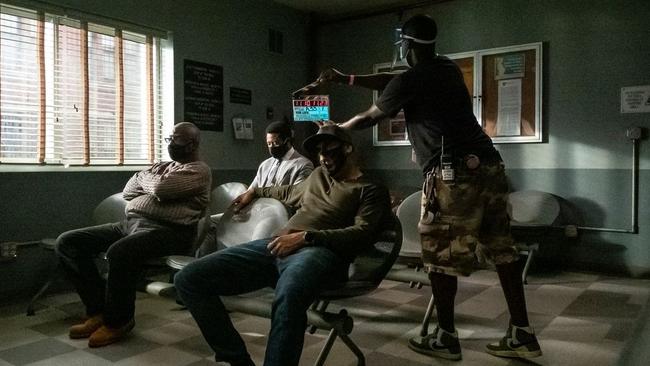
The protocols in place at S.W.A.T. are similar to those at other television shows. Sets and equipment are constantly cleaned. Most shows have a COVID-19 compliance officer, whose job is to make sure social distancing is being practiced and everyone is masked up.
Mr Moore, the actor, said, “They walk around with 6-foot sticks just to remind us what 6 feet is.”
Mr Ryan said the show is doing far fewer crowd scenes and now has 30 extras it uses on a recurring basis instead of the usual 250. If a guest star is brought in, the show pays extra to the actor to not work five days before the S.W.A.T. shoot.
Gone are big fancy buffets and large groups eating around a few large tables. Instead, everyone is given a boxed lunch to eat in shifts at individual tables arranged to resemble an elementary-school classroom.
“I thought it was the most depressing part of our set,” said Casey Kriley, co-chief executive of Magical Elves, a production company that makes the cooking show Nailed It for Netflix.
Besides protecting the cast, the zone system also allows shows to limit the potential damage of someone testing positive. On Nailed It, when a crew member tested positive, the show tested others who had been in contact with that person.
On S.W.A.T., directors often use 8K cameras, which have four times the resolution of 4K cameras and allow footage to be edited to create close-ups even if the actors are socially distanced. “There are all sorts of tricks that we utilise in that regard,” Mr Ryan said.
A star’s usual posse — publicists, agents, managers — is now barred from sets, as are network executives. Even writers and executive producers are often at home watching the action online.
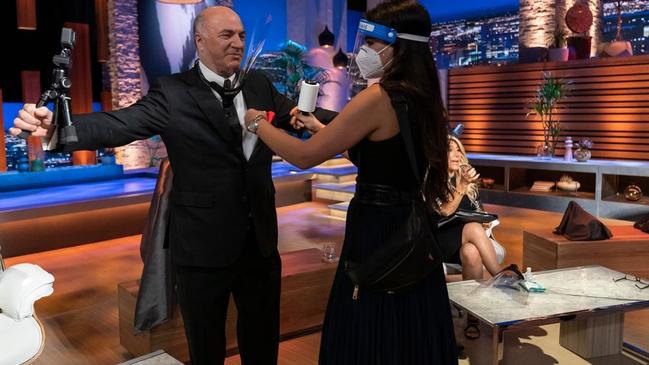
Jay Roach said he directed the HBO movie Coastal Elites, a series of one-character vignettes about the effect of the coronavirus that starred Bette Midler, Issa Rae and Sarah Paulson, from his own kitchen, while the actors were filmed in their own properties. “We might as well all have been in space stations,” he said.
A few such changes likely will remain even when the masks and swabs are put away, according to Mr Frost of Sony Pictures Television.
“You don’t have the luxury of shooting a scene 10 times,” Mr Frost said. “You’re shooting fewer takes and getting it right.”
Mr Wells, the producer, believes the days of scripts coming in not long before shooting are over. “You cannot do this without fully completed scripts weeks in advance,” he said. “It allows everyone to really prepare properly and is ultimately the most efficient way to work.” The unions that represent actors, producers, cameramen and others on scripted TV shows hammered out an official manual on COVID-19 protocols in September, working with the major studios and networks.
Liv Tyler, a co-star of Fox’s 911: Lone Star, quit because she didn’t want to travel from the British countryside to the show’s sets in Los Angeles, given the risk of contracting coronavirus, people close to the show said.
Netflix cancelled its female wrestling drama Glow because the pandemic “makes shooting this physically intimate show with its large ensemble cast especially challenging,” a company spokeswoman said.
Much of the “nonfiction” or reality-TV world isn’t unionised, and some people in that field say safety protections are less stringent.
“The jobs I was offered, I didn’t feel the sets were safe enough,” said Genevieve Wong Sexology, a talk show on the new streaming service Quibi, doesn’t make any effort to limit movements of people or use a zone system to protect those going on-camera, leaving some people on the set nervous, members of the production team said. The supervising producer once asked a guest to drink cold water in an effort to bring his temperature down, rather than sending him home, according to two members of the production team.
A person close to the show said the guest had checked no symptoms on the show’s questionnaire, had previously tested negative for Covid, and was merely overheated. In a written statement, the show’s producer, Madaket Films, said: “We put the health and safety of our staff, crew and guests before anything else.” Production companies behind many unscripted shows don’t get the same financial help from networks for added safety costs as the big studios that make scripted shows, some producers said.
“More often than not, it’s the networks who are to blame for not well funding projects,” said nonfiction producer Johanna Vanderspool. She is the lead organiser of the Nonfiction Professionals Union, a group seeking to align itself with one of the established Hollywood guilds.
Some reality-TV shows require producers and crew to sign COVID-19 release waivers, she said. “We are the stepchild of the industry,” she said.
Discovery Inc., whose networks run much nonfiction content, initially told producers that it won’t help pay for tests. It has since softened that stance, though it isn’t doing daily testing, like some other networks and studios. Cast and crew involved in some of its shows get tested every two weeks via at-home tests that are mailed to them, a person familiar with the matter said.
A Discovery spokesman said the amount of testing can vary from show to show, and the company works with producers to determine the best approach.
Some unscripted shows that have shorter production cycles and deeper pockets, such as ABC’s “The Bachelor,” are taking a “bubble” approach, requiring actors, producers and crew to remain in a location for several weeks, just as the National Basketball Association did with players and staff during its restarted season. The TBS show “Go-Big,” an extreme talent competition, just wrapped a 10-week shoot in Macon, Ga., with frequent testing and isolation.
“The temptation for people to wander off site is a lot less than if you’re in Los Angeles or New York or Atlanta,” said “Go-Big” Executive Producer Conrad Green.
HBO’s political talk show “Real Time with Bill Maher” recently returned to its Los Angeles studio with a small audience. All of them were tested before attending the taping, wore masks and sat more than 6 feet apart.
“It was a herculean effort,” said Mr Maher, who had been taping his show from his Beverly Hills home, often with only his dog as an audience. He made no secret of how much he missed doing the show in front of a crowd.
“At a certain point,” he said, “I just couldn’t tell jokes anymore to nobody.”
Dow Jones



To join the conversation, please log in. Don't have an account? Register
Join the conversation, you are commenting as Logout